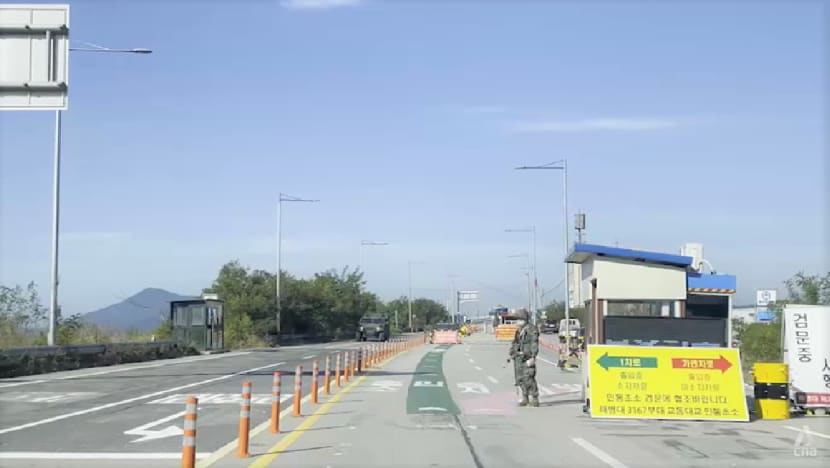South Koreans living near Korean border unperturbed by rising military tensions
Military tensions on the Korean peninsula are at their highest since 2017, following the recent tit-for-tat missile firings between South Korea and North Korea.

South Korean soldiers inspect the identification documents of people passing through military checkpoints into a fenced-up Gyodong Island.
GYODONG ISLAND, South Korea: Armed with assault rifles, South Korean soldiers inspect and scrutinise the identification documents of people passing through military checkpoints into a fenced-up Gyodong Island.
North Korea is just about two kilometres away, separated only by a stretch of water.
Security is tight around the small island of Gyodong, located in the Ganghwa region of Incheon city. Barbed wire along the coastline serves as a safeguard against North Korean infiltration.
But even with the recent blitz of missile launches from the North, many South Koreans – including those who live near the border – remain unperturbed.
Some even want the barbed wire removed.
This is despite tensions on the Korean peninsula being at their highest since 2017, following the recent tit-for-tat missile firings between South Korea and North Korea.
HEIGHTENED MILITARY TENSIONS
Both sides exchanged warning shots off the west coast on Monday (Oct 24), accusing each other of breaching their maritime borders.
The latest exchange of fire came amid simmering tensions, with North Korea carrying out weapons tests at an unprecedented pace this year.
The North is preparing to carry out its seventh nuclear test by the end of this year, according to intelligence officials from the United States (US) and South Korea.
On Wednesday, the US, South Korea and Japan warned that a North Korean nuclear test would warrant an "unparalleled” response.
Following talks in Tokyo, the three nations' deputy foreign ministers said they would ramp up their deterrence in the region.
Analysts believe another nuclear test could advance Pyongyang’s capabilities in developing more tactical weapons, putting South Korea’s security at greater risk.
But on Gyodong Island, instead of preparing for conflict, some villagers want the barbed wire removed.
Related:
After the end of the Korean War in 1953, the area was designated as part of the Civilian Control Zone, which serves as a restricted area for civilians.
There used to be loudspeakers on both sides, each blaring propaganda announcements over the border. In 2018, they were brought down because the two Koreas agreed to stop all hostile acts against each other.
RESIDENTS WANT FEWER RESTRICTIONS
The loudspeakers are now gone, but the barbed wire remains.
Villagers have been lobbying for its removal, together with the military checkpoints, because it restricts movement and hampers its tourism-driven economy, said Mr Hwang Kyo-Ik, the village head of Gyodong Island.
"Tourists and residents coming to the island feel very uncomfortable. Gyodong Island is fenced up on all sides,” he added. “It is like a chicken coop. We can’t go anywhere near the beach."
Villagers said the barbed wire is more symbolic than preventive, since North Korea has not set up similar structures on the its side of the border. Part of their fearlessness comes from familiarity - they have lived there their whole lives.
Related:
"Before, we couldn't even hear the TV in my house because of the propaganda broadcasts from North Korea,” said Mr Hwang.
“So we are used to all of this, and Gyodong residents are less responsive when it comes to security. We don't get scared because North Korea fires missiles."
Meanwhile, the island’s proximity to the North has been drawing in tourists.
South Korean Kim Se-Kwon recently visited the island with some friends, because it is the closest he could get to North Korea, his father’s hometown.
"My father came to the South during the Korean War from the North’s Pyongan Island and participated in the war here for two years,” said the 68-year-old. “I think my father’s brothers are still in North Korea.
“His lifelong wish was to reunite with them, but it was never realised."
















